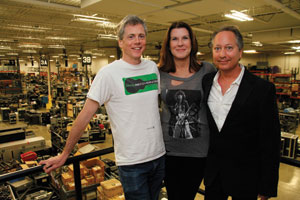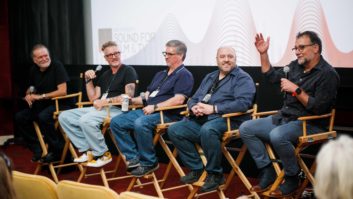
Road Recovery co-founders Gene Bowen, left, and Jack Bookbinder flank Masque Sound GM/VP Stephanie Hansen at the Masque Sound warehouse.
One of the all-too-true clichés of the music and entertainment industry is that it is riddled with temptation. Drug use, alcohol consumption and countless other types of behaviors can very easily, and often very quickly, steer a life right off the rails. Some get sober, some don’t. Some are able to manage change, and some continue to struggle. It’s the rare individuals who go on to devote the rest of their lives to giving something back.
Gene Bowen crashed and burned in 1992. He had lived more than a decade on the road as a tour manager to many different artists, and the life caught up with him, to the point where he faced death. He got sober, and he walked away from the music industry for a job with the post office. He considered himself lucky. In 1994, two years sober, Bowen ran into a semi-regular acquaintance from back in the day, Jack Bookbinder, who was part of the Jeff Buckley management team. Bowen talked openly about the changes in his life and the support he had received from the medical community. Bookbinder, band and label offered him a safe-as-could-be re-entry into tour management.
“We toured the world for two years, and I was very open about my life,” Bowen says, “to the extent that memos were being sent through the Sony system [Buckley was signed to the label] and wherever I went, people who had dealt with adversity in their life would come forward—‘I have dyslexia, I lost a loved one. I have problems with addiction.’ I would meet with them, and I began to see my industry in a whole new light, how different it could be with a little support.”
At that same time, Bookbinder discovered he was at-risk for Type-II diabetes and set about reorganizing the way he lived his life. He and Bowen began discussing how great it would be if they could somehow bring together the entertainment industry, where they had experience and connections, and the medical world, where they had both found support. And they wanted to work with critically at-risk youth in New York City, the hard cases—institutionalized, hospitalized, in foster care, and everywhere in between.
In 1998, funded by seed money from Sony Music Entertainment and Dreamworks Records, Bowen and Bookbinder co-founded the nonprofit, Road Recovery. The mission was to teach youth about life skills through the process of creating music and playing it out in the world, including all facets of concert/event production.
“Our first program was RoadTrax at The Graham School (for Graham-Windham Services), a 208-year-old foster care agency in Hastings-on-the-Hudson,” recalls Bookbinder. “We put on a live show and had dance, drama, music, event management. The kids did box office and stage art, with concessions at the final show. There were over 100 at-risk kids involved for weeks as we were putting it together. We’ve gone on since then and done multistage shows, such as Pink Floyd-The Wall, and it’s all done by the kids.”

Youth from the Road Recovery program with Masque Sound’s Stephanie Hansen in the organization’s offices.
“We are not about launching careers in the entertainment industry,” Bowen adds. “We work in partnership with healthcare providers to help these kids transition to whatever it is they end up doing. We mix in life skills, developing communication, learning how to receive help, how to confront something you don’t like, showing up on time and respecting your peers. Putting on a concert is a process, with a beginning, middle and end, and it has worth and it has value. Many of these kids have been told forever that they have no value.”
Over the years, the program has expanded to include painting, design, dance, drama, video and, of course, recording, made possible through the contributions of Road Recovery board member James Walsh, co-owner of Threshold Recording Studios NYC, who offered the organization studio time, rehearsal space and a small set of offices in the same building as his studio, one block from Port Authority, with easy access for kids coming to twice-a-week program sessions.
“One of our mantras is Being Present,” says Bowen, “which is one of the greatest things you can give a kid. In addition to showing up, it’s important to invest the time and be consistent. The response from our industry, when artists and engineers and musicians come in to talk to them, has been just fantastic. Some of these kids have been through incredible traumas, and here comes a guy with tattoos and a guitar who tells his story of how he made it. Then the kid might write a song about it, and it moves people and affects an audience. What was once a deep dark secret can be turned into a force. That’s where the magic comes, and you just stand in awe of it.”
The list of people who have come to engage with Road Recovery kids ranges from A-list artists to twice-fired roadies. All have something to offer through their individual experience. Stephanie Hansen, vice president and general manager at Masque Sound in New Jersey, says she had heard of the organization when she saw a Road Recovery benefit concert featuring Slash in 2011 on the marquee at Nokia (Best Buy) Theatre in midtown Manhattan. She explored further, and in December of last year plunged in full force.
“I began going to Road Recovery outreach events in schools, medical facilities and out in the world,” says Hansen, herself 15 years sober. “I got to know Jack and Gene, and could tell they were coming from an honest and genuine place. They’re passionate about the work they do, but they need resources to do that. So after attending a number of events, I started talking to them about making a charitable donation, which of course is tax-deductible for our business and at the same time it helps them reach more kids. Writing a check when you are running a successful business is not a difficult thing to do, and I think more people should do it.
“I’ve been blessed with tremendous success as a result of being sober,” she adds. “The recovery model is very much about giving back. I’ve done it personally in terms of sponsoring young women in sobriety. To take it to another place professionally is just as satisfying. And maybe I can encourage other people in our industry, sober or not, to get involved with an organization like Road Recovery. We all have something of value to share.”







